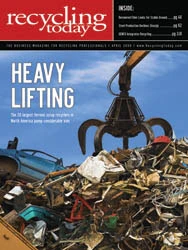The "Buy American" provision in the 2009 American Recovery and Reinvestment Act has provoked an outcry of protectionism not only from the global court of public opinion but from many on our own shores as well. Americans rightly believe that free trade is our birthright and that comparative advantage is the bedrock of free trade.
It’s my view that America is the world’s last remaining "trade virgin." As a nation, we are so completely and blissfully unaware of the protectionist behavior of many of our trading partners that we actually rush in to apologize when some of us stand up and say "ouch," because we truly just don’t know any better.
I believe it’s time for Americans—as a nation—to lose our trade virginity and wake up to the fact that for many in the rest of the world, comparative advantage has been abandoned in favor of mercantilism, favoritism and pure horse trading. We cannot possibly play the free-trade game fairly all by ourselves.
In my nearly 30 years as an equity analyst covering the steel sector, most of those for a large global investment bank, I’ve seen that the steel trade outside of America is often managed trade and is anything but free. Americans aren’t told this though; our public opinion is driven by academics wedded to theory over proven empirical facts, or worse, as well by as the vested interests in this country that know better but make their living by looking away.
I believe that many other nations manage trade in ways that we simply cannot in the United States today. Many of our trading partners excel at creating trade barriers and then calling us protectionist. They put tariffs on our goods and they subsidize their domestic industries with not only cash, but also with lax environmental standards, raw material export restraints and transportation, energy and other subsidies. Channels of distribution are controlled by the steel mills themselves in multiple regions—the mills are the guys who would be importing—not exactly an even playing field. Not to mention currency manipulation—let’s call it what it is, administration notwithstanding.
To the casual observer, the American steel industry most probably looks like the boy who cried wolf—the import-whining has been going on for 50 years! The casual observer also most probably believes that Japan is still the low-cost producer and our steel industry is a rust-bowl dinosaur.
Hogwash and ancient history. Today America is globally acknowledged as one of the world’s lowest-cost places to make steel. Witness the dozen or so American steel companies acquired with rubles, rupees, yen and euros over the past half-dozen years. We have the comparative advantage! We fixed it and we won!
There have been fundamental shifts in the industry’s structure in the past 40 years. Low-cost, non-union mini-mills now make up more than half of this country’s capacity, up from virtually zero 40 years ago. And the remaining "old line" steel companies have forged a brave new partnership together with the leadership of the United Steelworkers union, aggressively restructuring wages, benefits and manning. They gave up jobs, pay and benefits to ensure the industry’s future global competitiveness. There’s a blueprint for the UAW in this history here.
But having said all this, it occurs to me that there may be a far better path for American steel than the "Buy American" provision. Let’s demand that America uphold our own ideals of free trade and insist that this country not buy steel from any trading partner that distorts the backbone of free trade through their own protectionism or mercantilist currency manipulation. Drive a stake in Smoot-Hawley!
The American people should be eager to see this outcome, defending our principles of free trade! Even so, we suspect that the rallying cry from our trading partners will likely be more of a whimper. Our trading partners—and our own domestic vested interests—have zero interest in welcoming the loss of our national trade virginity. There are meaningful dollars at stake in maintaining the status quo, the same greed and short-term thinking that created this mess to begin with.
And when, in the not-too-distant future, our children begin packing up for high-paying jobs in foreign locales, we start to wonder, "How did this happen?" perhaps someone might remember there were a few small voices crying, "We’ve had enough!"
The author has spent more than 20 years with Salomon Brothers in New York and Chicago as a top-rated steel analyst. Today she manages a boutique equity research firm in Chicago called Applebaum Research and publishes the Steel Market Intelligence newsletter. In 2008 less than 5 percent of her firm’s revenues came from companies engaged in the manufacture of steel. She can be reached at 847-433-8517.

Explore the April 2009 Issue
Check out more from this issue and find your next story to read.
Latest from Recycling Today
- Aqua Metals secures $1.5M loan, reports operational strides
- AF&PA urges veto of NY bill
- Aluminum Association includes recycling among 2025 policy priorities
- AISI applauds waterways spending bill
- Lux Research questions hydrogen’s transportation role
- Sonoco selling thermoformed, flexible packaging business to Toppan for $1.8B
- ReMA offers Superfund informational reports
- Hyster-Yale commits to US production





